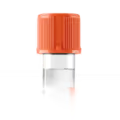Do I need a CCP antibody test?
Experiencing joint pain, stiffness, or swelling that won't go away? Could your immune system be attacking your joints, and could a CCP antibody test reveal what's happening?
CCP antibodies are proteins your immune system produces when it mistakenly targets your joint tissue. Elevated levels can signal rheumatoid arthritis, often before severe damage occurs.
Testing your CCP antibody levels gives you a vital snapshot of your joint health and immune activity. It's the first step toward understanding your pain and creating a personalized plan to protect your joints and improve your quality of life.
Method: FDA-cleared clinical laboratory assay performed in CLIA-certified, CAP-accredited laboratories. Used to aid clinician-directed evaluation and monitoring. Not a stand-alone diagnosis.

A derived biomarker is a value that is calculated from other directly measured biomarkers rather than being measured directly in the lab.
Get tested with Superpower
If you’ve been postponing blood testing for years or feel frustrated by doctor appointments and limited lab panels, you are not alone. Standard healthcare is often reactive, focusing on testing only after symptoms appear or leaving patients in the dark.
Superpower flips that approach. We give you full insight into your body with over 100 biomarkers, personalized action plans, long-term tracking, and answers to your questions, so you can stay ahead of any health issues.
With physician-reviewed results, CLIA-certified labs, and the option for at-home blood draws, Superpower is designed for people who want clarity, convenience, and real accountability - all in one place.
Key benefits of CCP antibody testing
- Confirms rheumatoid arthritis early, often before joint damage appears on X-rays.
- Flags aggressive disease risk to guide stronger treatment from the start.
- Clarifies joint pain when other arthritis markers like rheumatoid factor are negative.
- Predicts future joint erosion and disability to protect long-term mobility.
- Guides biologic therapy decisions by identifying patients who need intensive treatment.
- Tracks disease activity over time when combined with inflammatory markers and symptoms.
- Best interpreted with rheumatoid factor, CRP, and clinical joint examination findings.
What is CCP antibody?
CCP antibody (anti-cyclic citrullinated peptide antibody) is an autoantibody produced by the immune system that mistakenly targets proteins in the body that have been chemically modified through a process called citrullination. Citrullination occurs when the amino acid arginine in a protein is converted to citrulline, a change that normally happens during inflammation or cell stress. In certain individuals, the immune system recognizes these citrullinated proteins as foreign and generates antibodies against them.
A signature of immune misdirection
CCP antibodies are highly specific markers of rheumatoid arthritis, an autoimmune disease where the immune system attacks the lining of joints. Their presence reflects an underlying breakdown in immune tolerance. These antibodies can appear years before joint symptoms develop, making them valuable for early detection.
Why citrullination triggers an immune response
The exact reason some people develop CCP antibodies remains unclear, but genetic factors and environmental triggers like smoking are known contributors. Once formed, these antibodies contribute to chronic joint inflammation and tissue damage, playing an active role in disease progression rather than simply marking its presence.
Why is CCP antibody important?
CCP antibody (cyclic citrullinated peptide antibody) is a highly specific immune marker that reveals whether your body is mistakenly attacking the lining of your own joints. It appears years before joint damage becomes visible and helps distinguish rheumatoid arthritis from other causes of joint pain. This test offers a window into autoimmune activity that shapes long-term joint health, mobility, and systemic inflammation.
When the test comes back negative
Most healthy people have undetectable or very low CCP antibody levels, typically below 20 units. A negative result suggests that joint symptoms, if present, are unlikely due to rheumatoid arthritis. It reassures that the immune system is not producing this particular self-targeting antibody, though other forms of inflammatory arthritis remain possible.
When levels rise above normal
Elevated CCP antibodies signal that the immune system has begun recognizing citrullinated proteins in joint tissue as foreign. This autoimmune response drives chronic inflammation in the synovium, the delicate membrane lining joints. Over time, unchecked inflammation erodes cartilage and bone, leading to joint deformity, stiffness, pain, and loss of function. High levels predict more aggressive disease and greater risk of permanent joint damage.
The bigger immune and inflammatory picture
CCP antibodies don't just mark joint disease - they reflect broader immune dysregulation that can affect the heart, lungs, and blood vessels. Early detection allows for intervention before irreversible damage occurs, preserving quality of life and reducing long-term disability.
What do my CCP antibody results mean?
Low or negative CCP antibody levels
Low values usually reflect the absence of autoimmune activity directed against citrullinated proteins in the joint lining. This is the expected finding in healthy individuals and suggests no detectable immune-mediated attack on synovial tissue. Negative results are seen in most people without rheumatoid arthritis and help rule out this specific autoimmune process when joint symptoms arise from other causes.
Optimal CCP antibody range
Being in range suggests no measurable antibody production against cyclic citrullinated peptides. The optimal value is consistently negative or undetectable across all ages and both sexes. There is no physiologic reason for these antibodies to be present, so the lower the level, the better. A negative result supports normal immune tolerance to self-proteins in joint tissues.
High or positive CCP antibody levels
High values usually reflect an autoimmune response targeting citrullinated proteins found in the synovium and cartilage. This pattern is highly specific for rheumatoid arthritis and often appears years before joint symptoms develop. Elevated levels indicate active immune dysregulation and correlate with more aggressive joint inflammation, erosive disease, and systemic involvement. The higher the titer, the greater the likelihood of progressive joint damage.
Factors that influence CCP antibody interpretation
Results remain stable over time in most individuals. Levels do not fluctuate with acute illness or medication use in the way inflammatory markers do, making CCP antibodies a reliable diagnostic and prognostic tool in suspected rheumatoid disease.

.svg)









.avif)
.avif)


